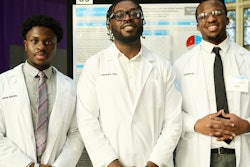The Unapologetically Free virtual conference featured talks about the Black college experience, the process of grieving loss, and knowing when to seek mental health assistance. Dr. Meag-gan O'Reilly
Dr. Meag-gan O'Reilly
The two-day event – hosted by United Negro College Fund (UNCF), the Steve Fund, and Thurgood Marshall College Fund (TMCF) Apr. 11-12 – focused on matters of student mental health on Black college campuses.
"Compared to 61% of white students, 75% of Black college students report that they tend to keep their feelings about how hard college is to themselves,” said Victoria Smith, strategy analyst for the UNCF Institute for Capacity Building. “Additionally, Black students were more likely to experience anxiety and depression than other groups but were less likely to actually seek mental health services."
Dr. Meag-gan O'Reilly, psychologist, co-founder of Inherent Value Psychology Inc., and lecturer at Stanford University’s School of Medicine, urged college students to think about their “un-Resume Self,” the defining characteristics and details of oneself that would not appear on a resume. For example, some of O’Reilly’s were that she was a first-generation Jamaican American and the youngest sibling in her family.
College is conventionally thought of as a time for leaving the nest, self-exploration, and individual growth. But once the concepts of college and mental health are “decolonized” of its white, cisgender roots, people can recognize that the Black college experience can be about more, O’Reilly said.
“When we decolonize this season of your life, we also get to bring in some more nuance,” O’Reilly said. “[College] can also be about deepening your affiliations. Many of you in the room have chosen to go to HBCUs because maybe there's some legacy in your family, or you want to deepen your identity as a person in the African diaspora."
O’Reilly stressed that students should not – nor let others – minimize and criticize their unique college experiences for not being conventional ones. If it’s good for your well-being, do more of it, she added.
"Your walk doesn't have to look like everyone else's, to give yourself the spaciousness to have both your joys and your sorrows that will come up,” O’Reilly said. “You might come across students and colleagues that are glad to be far away from home and living their best life. And you might be homesick. … The emotions that you're feeling are valid, and processing through those lovingly will be part of the battle."
Another panel focused on loss, stress, and the harms of not properly processing grief. Grief can result from loss of a loved one, but can also come from the loss of other things, such as jobs and relationships, said Dr. Delane Casiano, president of Global Health Psychiatry and psychiatrist specializing in cultural psychiatry and women’s mental health.
For today’s college students, grief may stem from high school experiences lost due to the COVID-19 pandemic and isolation, such as prom and graduation, she said. Such milestones may seem insignificant but can represent much more, Casiano said.
Grief should be processed, Casiano said, lest it begin to affect everyday life and cause serious mental and physical stress. The goal is for the five stages of grief – denial, anger, bargaining, depression, and acceptance – to result in closure, said Dr. James Lee, Jr., medical director of adult services at Springbrook Behavioral Health and founding member of Global Health Psychiatry.
“Gaining closure does not mean forgetting. Gaining closure just means that you're able to manipulate your feelings, your situation, [in] a way that is more helpful and more beneficial for you,” Lee said. “When you need to go back and feel or remember or rehash those feelings from before and think about the grief for that loved one that might have passed or that situation, you can go back and pull it up. ... You can go back and pick it up, open it up, manipulate it how you need to. The key is you're able to then close it, move it, and then go to whatever is right in front of you.”
The two emphasized that it took strength, not weakness, to ask for mental health support.


















